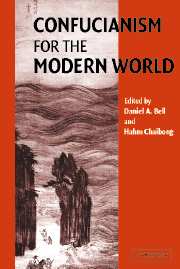Book contents
- Frontmatter
- Contents
- List of Contributing Authors
- Acknowledgments
- Editors' Note
- Introduction: The Contemporary Relevance of Confucianism
- PART I CONFUCIAN PERSPECTIVES ON DEMOCRACY
- 1 Constitutionalism, Confucian Civic Virtue, and Ritual Propriety
- 2 The Challenge of Accountability: Implications of the Censorate
- 3 Confucian Democrats in Chinese History
- 4 Mutual Help and Democracy in Korea
- 5 A Pragmatist Understanding of Confucian Democracy
- 6 The Case for Moral Education
- PART II CONFUCIAN PERSPECTIVES ON CAPITALISM
- PART III CONFUCIAN PERSPECTIVES ON LAW
- Epilogue: Why Confucius Now?
- Index
2 - The Challenge of Accountability: Implications of the Censorate
Published online by Cambridge University Press: 28 August 2009
- Frontmatter
- Contents
- List of Contributing Authors
- Acknowledgments
- Editors' Note
- Introduction: The Contemporary Relevance of Confucianism
- PART I CONFUCIAN PERSPECTIVES ON DEMOCRACY
- 1 Constitutionalism, Confucian Civic Virtue, and Ritual Propriety
- 2 The Challenge of Accountability: Implications of the Censorate
- 3 Confucian Democrats in Chinese History
- 4 Mutual Help and Democracy in Korea
- 5 A Pragmatist Understanding of Confucian Democracy
- 6 The Case for Moral Education
- PART II CONFUCIAN PERSPECTIVES ON CAPITALISM
- PART III CONFUCIAN PERSPECTIVES ON LAW
- Epilogue: Why Confucius Now?
- Index
Summary
INTRODUCTION
Governance is currently a fashionable topic. Not only does the political establishment debate the issue, unlikely participants such as corporate boards (à la corporate governance) and development banks (e.g., the World Bank's New Development Paradigm) have also been drawn into the debate.
Despite the growing interest in the problem of governance, it is not clear whether we understand how to define, measure, and attain it. Governance itself can be broadly defined as the traditions and institutions by which authority in a country is exercised. But the quality of governance is another matter. So long as the question of whether governance is a means or an end remains unresolved, it will be difficult to arrive at a consensus measure of governance quality. If governance is a means to certain policy outcomes, one good measure should be the ability of a political system to produce sound policy. Good policies are generally oriented toward desirable social goals (such as economic growth), are consistent and coherent, and reflect broad national interests rather than narrow special interests.
The performance of a political system in producing good policy outcomes, however, turns out to be difficult to measure. Mayhew, for example, evaluates the performance of Congress in terms of how many significant laws it passes in each session. But a simple count of laws that Congress passes is misleading because it does not take into account the nature and scope of the agenda given to Congress.
- Type
- Chapter
- Information
- Confucianism for the Modern World , pp. 54 - 68Publisher: Cambridge University PressPrint publication year: 2003
- 7
- Cited by

